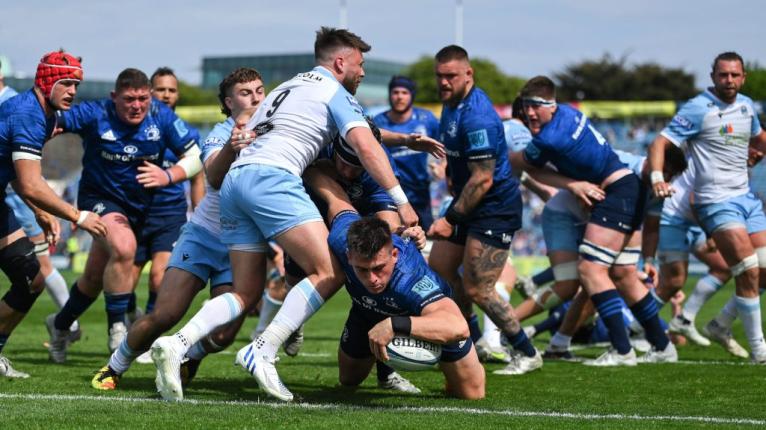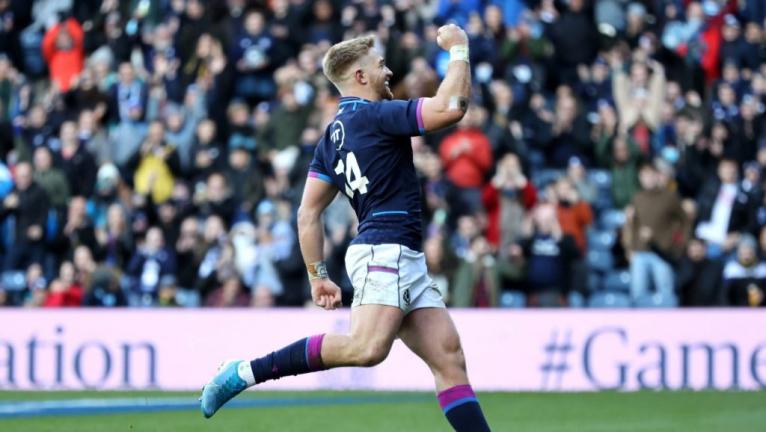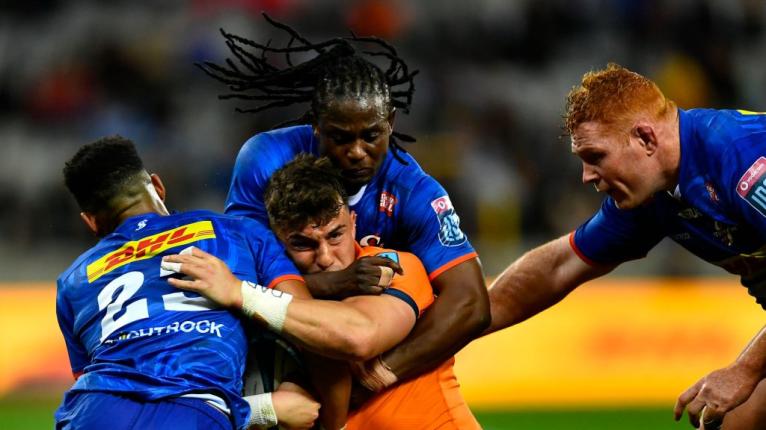Take a stroll down Glasgow’s Danes Drive this week, and you might catch the whiff of smoke. Not from the disposable barbecues smouldering away in nearby Victoria Park, or from fires burning in the hearths of the semi-detached homes lining the road, but from all the rockets Franco Smith has been applying to the backsides of his Glasgow Warriors players.
This is a group smarting from their atomisation at the hands of Leinster in the URC quarter-finals. Seventy-six points shipped at the RDS, a team that looked like it had given up the ghost and a coach, Danny Wilson, consigned to the chop.
Wilson’s Glasgow career started and ended in brutal circumstances. He operated under a recruitment freeze and the grim constraints of the pandemic at first. He finished up watching his team battered and bamboozled in the lair of the champions.
In trying to lace Glasgow with the pragmatism and set-piece smarts to take them to the next level, Wilson inadvertently led them away from the attacking flair through which the Warriors made their name. This departure from the Glasgow identity confused and, eventually, enraged supporters. Slow season ticket sales caused alarm. Dublin was a killer blow. Wilson paid the price with his job.
Anyone who reckoned Scott Robertson or Stuart Lancaster or Ronan O’Gara might swap their coveted jobs and forego a seat on the 2023 Test rugby merry-go-round to take up office at Scotstoun should be led on a frantic search for their missing marbles.
Smith was not a universally popular choice of replacement. He’d had six years at Benetton, taking the Italian franchise into the old Pro12. There were four years at the Cheetahs, who toiled in Super Rugby, and a brief spell as Springboks assistant under the disastrous reign of Allister Coetzee. Then it was back to Italy as national head coach, where his team were routinely pasted, before moving upstairs to lead the high-performance department in Rome. To the average rugby punter, it looks an unremarkable CV. To many Glasgow fans, it lacked the pulse-quickening, lip-smacking buzz they longed for. “Underwhelming” was the detractors’ term of choice.
Remember, though, Glasgow are not the admired force they were under Gregor Townsend or Dave Rennie. Since reaching the Pro14 final in 2019, the Warriors have done little. They were never going to attract a superstar darling of the coaching world, least of all in a World Cup year. Anyone who reckoned Scott Robertson or Stuart Lancaster or Ronan O’Gara might swap their coveted jobs and forego a seat on the 2023 Test rugby merry-go-round to take up office at Scotstoun should be led on a frantic search for their missing marbles.

Consider, too, how the roles and the numbers on Smith’s resume mask the reality of what he achieved. By any fair metric, Smith has never failed. He worked on a shoestring at the Cheetahs, nurtured a clutch of young talent and won two Currie Cups in four years despite the annual loss of key players to richer unions. He made Benetton credible in what has become the URC. He sacrificed Italy’s results in the Six Nations at the altar of youth development. Paolo Garbisi and Michele Lamaro and Danilo Fischetti and a great swathe more were given debuts. A load of the Azzurri heroes who conquered Cardiff in March were blooded on his watch. He favours a high-tempo, effervescent style of rugby – a must at Scotstoun after the toothless end to last season. All things considered, Smith is a sound appointment.
What’s at the top of the South African’s list? Work ethic, for one. In a frank end-of-season debrief, before Smith was even appointed, the players recognised their effort and fitness levels had fallen alarmingly short. Smith agrees.
He needs his players to rediscover their love of the game. He needs to reinvigorate a beleaguered fan base with the kind of riveting panache that created so many raucous evenings under the Scotstoun lights. He needs to maintain the lofty set-piece standards set by Wilson while adding gears to Glasgow’s attack. He needs to find a way of embedding the new arrivals – each signed before his appointment – in a system that works.
The “cheese puff brigade”, as Smith calls those carrying extra timber, are in at 7am for punishing fat-burning sessions on the wattbikes. Players have been kept in training later than usual, too.
Smith has not been shy in telling the Glasgow men what he thinks of them. Reality checks have been the order of the day. Smith has spoken passionately about the shipyard workers on the Clyde within sight of the stadium, the hours they spend at their toil and the paltry wage they receive compared to professional athletes. He has stressed the need to represent these people on the field.
The “cheese puff brigade”, as Smith calls those carrying extra timber, are in at 7am for punishing fat-burning sessions on the wattbikes. Players have been kept in training later than usual, too. They are warned that status and reputation count for nothing, and that the form man in his position will be rewarded with a starting jersey.
What Smith does have is a squad lusting to right the wrongs of Dublin. And it’s a good squad. There are issues at 10, where untried Tom Jordan starts the season opener against Benetton, and in the tight, where the hope is Sintu Manjezi, who played under Smith at the Cheetahs, could be the rugged bruiser the pack requires. But by and large, it is an encouraging mix of youth and experience, laden with internationals and those on the cusp of Test honours.
Kyle Steyn is a fascinating choice of captain. Steyn worked like a beast to make it in Scotland after playing Currie Cup rugby in South Africa. He is emotionally and tactically intelligent, an explosive carrier and tackler, and tremendously respected across the squad. As Ryan Wilson and Fraser Brown relinquish the co-captaincy positions, Steyn’s ascent feels like a passing of the baton.

So far, Smith has ruled out any further signings and ruled in a new style of play. Glasgow will be a far better watch this season, a vital step to re-establishing the bonds between team and supporters. Smith takes them to Italy, Wales and South Africa, the three countries where he spent his playing days, in the early throes of the URC. A poignant tour of his rugby career forms Glasgow’s quest to escape mediocrity. Underwhelming? We’ll see.
The picture is altogether different at Edinburgh, where Mike Blair must build on a heartening debut season as head coach. Plunged in at the deep end three months before the campaign began, Blair unshackled his players from the dull and risk-averse dirge that blighted the end of Richard Cockerill’s tenure.
He gave Edinburgh freedom to attack and belief in their abilities. He got more out of misfiring talents and infused Edinburgh with wow-factor despite the loss of Duhan van der Merwe, perhaps the greatest strike runner in the league. He is playing a huge role in moulding Blair Kinghorn into an international fly-half. He kept the stingy defence and gnarled set-piece that underpinned the best of the Cockerill era. Only Leinster and Munster conceded fewer tries and Edinburgh’s scrum and line-out stats were amongst the best in the league. In all, Blair did his reputation as a rookie head coach going places fast no harm.
There ought to be more opportunities to bring through the next crop. Patrick Harrison, a tantalising prospect in the Scotland Under-20s set-up, and Rudi Brown, an age-grade lock, are two at the forefront.
Blair wants to be a coach in the purest sense. The administrative side to running a club is more alien to him. This year, he will be forced to manage his squad carefully. With Champions Cup rugby secured, he needs his biggest beasts on the paddock and in good shape come the pool stage, when most of them will be returning from the autumn internationals. He also needs to keep Edinburgh competing near the top of the URC. Heavy rotation will be required and his depth will be tested.
There ought to be more opportunities to bring through the next crop. Matt Currie is the coming man in midfield. Patrick Harrison, a tantalising prospect in the Scotland Under-20s set-up, and Rudi Brown, an age-grade lock, are two others at the forefront.
Sam Skinner is a big signing from Exeter. Wes Goosen, who has arrived from the Hurricanes, brings a prolific try-scoring rate and is available to Edinburgh year-round. Nick Auterac, a Scottish-qualified free agent, looks a canny pick-up. There might yet be scope to bring Van der Merwe and Rory Sutherland back home as Worcester Warriors stand on the brink of collapse, though that would require additional funding from Scottish Rugby, fighting off attention from French presidents waving large chequebooks. Franco Smith has indicated he would be interested in both at Glasgow and if it comes to the crunch, it will be up to the union to decide how best that money is spent.

To some extent, last year’s fixture list was kind to Blair. Edinburgh were shielded from the harshest tasks and most ruthless venues: the Irish provinces, trips to South Africa’s heavyweights on their own turf. This time around, after a home curtain-raiser against the Dragons, it’s off to Durban then Cape Town, two colossal tests of whether Edinburgh can maintain and better what they did before.
Evolution in the east, revolution in the west. The see-sawing Scottish rugby rollercoaster cranks up again.


Comments
Join free and tell us what you really think!
Sign up for free